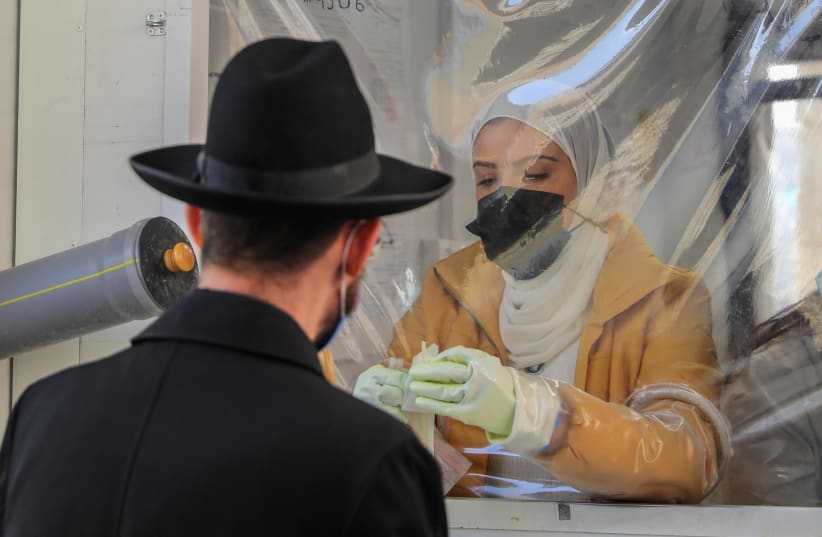Rabbi Zvi Kogan’s death underscores the growing threat of antisemitism and the need for global action.
By DR. RAHELI BARATZ NOVEMBER 27, 2024 04:46 A coronavirus test in Jerusalem. COVID goes beyond conflict and affects everyone. January 2022.
(photo credit: MARC ISRAEL SELLEM/THE JERUSALEM POST)
A coronavirus test in Jerusalem. COVID goes beyond conflict and affects everyone. January 2022.
(photo credit: MARC ISRAEL SELLEM/THE JERUSALEM POST)
It seems that the epidemic of antisemitism has become a real global threat in recent years. While it didn't start following the October 7 massacre, these events served as a powerful catalyst that brought hatred out of the shadows.
The tragic murder of Rabbi Zvi Kogan, a 28-year-old Chabad-Lubavitch emissary in Dubai, by Islamic terrorists in early 2024 further demonstrates this escalating crisis. His death, which shocked both the Jewish community and people of goodwill worldwide, illustrates how even in places of apparent progress and interfaith cooperation like the UAE, antisemitic violence can emerge with devastating consequences.
The infection rate has reached unprecedented levels, with reports showing a staggering 400% increase in antisemitic incidents over the past year. This exponential growth rate surpasses any previous outbreak in recent history, marking what epidemiologists would call a "super-spreader event" in social terms. The velocity and scale of this surge mirror the behavior of highly infectious diseases, demanding immediate global intervention.
The similarity between antisemitism and COVID-19 is striking. Just as we saw colorful maps describing the spread of the epidemic at its peak - green, yellow, orange, and red - we can now imagine the spread of antisemitism. If, in the past, many areas were "green" and relatively clean of this hatred, today, more and more areas are turning orange and red.
On social networks, hatred spreads like a virus. Antisemitic posts travel from device to device in seconds, echoing across the network without real supervision and strengthening ignorance and incitement.
What is the cause?
The root of the problem lies in ignorance. When people don't understand Jewish history, the lessons of the Holocaust, or the heavy price of blind hatred, they easily fall for antisemitic rhetoric. Therefore, education is the most effective cure for dealing with the antisemitism epidemic.
In the US, where campuses have become conflict-ridden arenas, there is an urgent need to implement comprehensive educational programs. Holocaust studies, which are currently mandatory in half of US states, must become a requirement, not just as a historical gesture but as a tool to prevent future infections of ignorance and hatred.
Legislation is another crucial tool. In Germany, for example, there are clear penalties against inciting calls such as "from the river to the sea," which deter potential hate spreaders. Other countries need to learn from this example. When there is a real price for spreading hatred - whether legal punishment or social sanctions - people will think twice before choosing it.
Furthermore, there is an urgent need for cooperation between countries. The antisemitism epidemic crosses borders and cannot be treated separately in each country. Information sharing between countries about incitement networks, joint global campaigns to raise awareness, and encouraging international agreements to protect Jewish communities are critical steps.
Democratic countries need to unite around shared core values and work together to eradicate hatred. Just as international cooperation works to fight terrorism and cross-border crime, we can also stop the spread of antisemitism and ensure a safer and more equal society for all.
Stay updated with the latest news!
Subscribe to The Jerusalem Post Newsletter
The public needs to understand that antisemitism is not just a problem of the Jewish community. It's a symptom of a broader disease - the collapse of democratic and liberal values. Throughout history, hatred of Jews has been the first stage in broader social disintegration.
Like COVID-19, the way to stop the epidemic is through combined action - education, regulation, international cooperation, and public awareness. The murder of Rabbi Kogan underscores the urgent need for these interventions. Only if all establishment factors and government ministries cooperate can we break the chain of transmission and stop the antisemitism epidemic before it too becomes the norm.
The author is the head of the Department for Combating Antisemitism and Enhancing Resilience, World Zionist Organization.

 By The Jerusalem Post (World News) | Created at 2024-11-27 02:55:07 | Updated at 2024-11-27 05:34:41
2 hours ago
By The Jerusalem Post (World News) | Created at 2024-11-27 02:55:07 | Updated at 2024-11-27 05:34:41
2 hours ago








